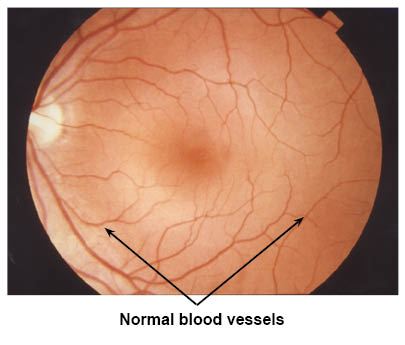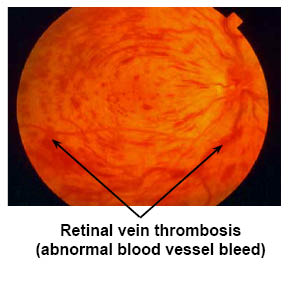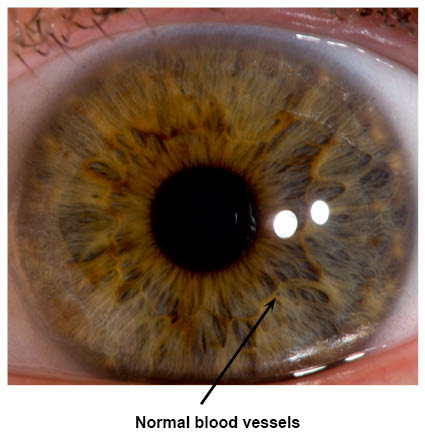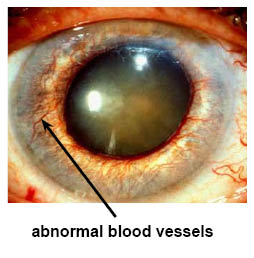Pan Retinal Photocoagulation (PRP) for Retinal Vein Thrombosis with Rubeotic Glaucoma
Information for patients from Ophthalmology
This leaflet is for people who have been diagnosed with rubeotic glaucoma following a retinal vein thrombosis (occlusion), who need laser treatment.
What is a retina?
The retina is a thin lining of the back of the eye that is light sensitive and enables your brain to see images.
What is a retinal vein thrombosis (occlusion)?
The main blood vessel that drains the blood from your retina has become blocked, and the swelling and bleeding from this leads to loss of vision (eyesight).
-
 Normal blood vessels
Normal blood vessels -
 Retinal vein thrombosis (abnormal blood vessel bleed)
Retinal vein thrombosis (abnormal blood vessel bleed)
What does rubeotic mean?
Abnormal reddish discoloration.
What is rubeotic glaucoma?
If the blood vessel in your eye becomes blocked, your eye starts to make new abnormal vessels. Some of these vessels form on the coloured part of your eye (iris) and sometimes they also form on the retina.
-
 Normal blood vessels
Normal blood vessels -
 Abnormal blood vessels
Abnormal blood vessels
If they are not treated, these abnormal vessels can stop fluid draining normally from the front chamber of your eye. This causes the pressure in your eye to rise, and can lead to a condition known as rubeotic glaucoma (also called neovascular glaucoma).This can be painful, and can lead to the loss of any of your remaining sight.
What is panretinal photocoagulation (PRP)?
PRP is a laser procedure which makes a lot of small burns on your retina. The treatment aims to stop the growth of the abnormal blood vessels on the retina and iris.
How does PRP treat rubeotic glaucoma?
PRP stops the growth of the abnormal new blood vessels and makes them shrink away. This can prevent the development of painful rubeotic glaucoma, but does not restore your vision.
Are there any alternatives?
No, at the moment this is the only option.
Can I drive myself to the hospital?
It is not advisable to drive yourself, your vision may be blurred from the eye drops for several hours after your procedure, and you may feel dazzled from the laser light. You should arrange for someone to collect you after your treatment and take you home, or you may use public transport.
What happens when I arrive at hospital?
Your appointment letter will tell you which department reception to report to, at what time and date. The receptionist will direct you to the clinic, where you will be called by a member of the clinic staff.
How long will I be at the hospital?
The procedure is done in an outpatient clinic (you will not need to stay in hospital overnight). Please allow two hours for your appointment. Occasionally you may need longer than two hours, but that is unlikely. The treatment itself usually takes about half an hour.
What happens before the laser treatment?
You will have the procedure explained to you before treatment begins. You will be able to ask any questions before giving your consent to the procedure. Remember that you can withdraw your consent for treatment at any time.
You may have a vision test, so please bring your distance glasses with you to your appointment. If you wear contact lenses please be prepared to remove them for your appointment, and bring some distance glasses if you have them. You will be given drops to enlarge your pupil.
What happens during the laser treatment?
After your doctor has explained the procedure to you, an anaesthetic drop will be put in your eye to numb it. Your doctor will then place a contact lens on the surface of your eye to focus the laser.
You may see lots of flashes of light as the laser acts on your retina. It is important to sit still during the laser procedure.
Will the procedure hurt?
You may feel some discomfort during your treatment.
What happens after the treatment?
Immediately after the laser treatment, your eye may feel dazzled. You can leave the hospital as soon as you feel ready.
You should not drive or operate machinery on the same day as your procedure.
How do I look after my eye at home?
There is no special aftercare; the laser doctor will advise you of any extra drops you need to use or precautions if necessary. Continue using your usual eye drops as normal.
Will I need a follow-up appointment?
You will usually be seen again in the eye clinic at a later date to check your condition. The doctor will advise you and give you a slip to take to reception for them to book this appointment before you leave hospital.
What are the risks / adverse effects of PRP laser treatment?
Your eye may feel a bit sore after your treatment, but this should settle down.
Occasionally your eye can develop bleeding, due to the blood vessels shrinking.
Your eye may be left with the following long-term effects.
PRP may leave your eye more sensitive to strong light.
Your peripheral (around the edge) vision may be worse.
Your eye might take longer to adjust to and from bright and dark conditions.
In case of emergency, please contact William Harvey Hospital on 01233 633331, and ask for the on-call ophthalmologist.